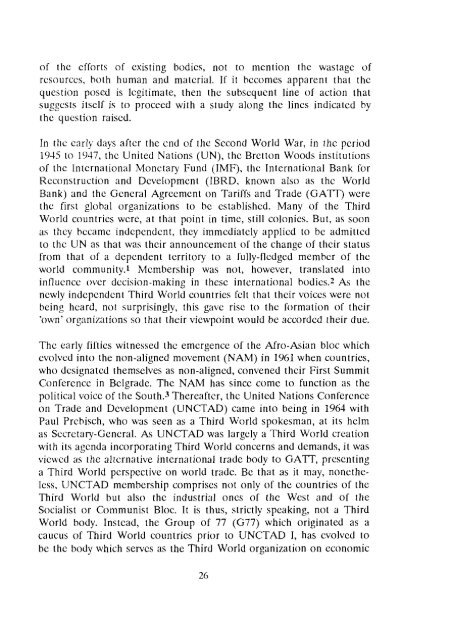ifda dossier 74 - Dag Hammarskjöld Foundation
ifda dossier 74 - Dag Hammarskjöld Foundation
ifda dossier 74 - Dag Hammarskjöld Foundation
You also want an ePaper? Increase the reach of your titles
YUMPU automatically turns print PDFs into web optimized ePapers that Google loves.
of the efforts of existing bodies, not to mention the wastage of<br />
resources, both human and material. If it becomes apparent that the<br />
question posed is legitimate, then the subsequent line of action that<br />
suggests itself is to proceed with a study along the lines indicated by<br />
the question raised.<br />
In the early days after the end of the Second World War, in the period<br />
1945 to 1947, the United Nations (UN), the Bretton Woods institutions<br />
of the International Monetary Fund (IMF), the International Bank for<br />
Reconstruction and Development (IBRD, known also as the World<br />
Bank) and the General Agreement on Tariffs and Trade (GATT) were<br />
the first global organizations to be established. Many of the Third<br />
World countries were, at that point in time, still colonies. But, as soon<br />
as they became independent, they immediately applied to be admitted<br />
to the UN as that was their announcement of the change of their status<br />
from that of a dependent territory to a fully-fledged member of the<br />
world community.1 Membership was not, however, translated into<br />
influence over decision-making in these international bodies.* As the<br />
newly independent Third World countries felt that their voices were not<br />
being heard, not surprisingly, this gave risc to the formation of their<br />
'own' organizations so that their viewpoint would be accorded their due.<br />
The early fifties witnessed the emergence of the Afro-Asian bloc which<br />
evolved into the non-aligned movement (NAM) in 1961 when countries,<br />
who designated themselves as non-aligned, convened their First Summit<br />
Conference in Belgrade. The NAM has since come to function as the<br />
political voice of the South.3 Thereafter, the United Nations Conference<br />
on Trade and Development (UNCTAD) came into being in 1964 with<br />
Paul Prebisch, who was seen as a Third World spokesman, at its helm<br />
as Secretary-General. As UNCTAD was largely a Third World creation<br />
with its agenda incorporating Third World concerns and demands, it was<br />
viewed as the alternative international trade body to GATT, presenting<br />
a Third World perspective on world trade. Be that as it may, nonethc-<br />
less, UNCTAD membership comprises not only of the countries of the<br />
Third World but also the industrial ones of the West and of the<br />
Socialist or Communist Bloc. It is thus, strictly speaking, not a Third<br />
World body. Instead, the Group of 77 (G77) which originated as a<br />
caucus of Third World countries prior to UNCTAD I, has evolved to<br />
be the body which serves as the Third World organization on economic
















